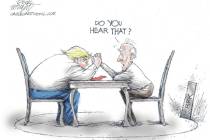Fleeting expletives
In this year's television broadcasts of the "Billboard Music Awards," some of the young performers -- whether in spontaneous exuberation, or in a more calculated effort to bolster their credentials as anti-establishment rebels -- behaved badly. They said some bad words.
Now, few who have listened to the repertoire of the artists being honored could pretend any real shock. The clean-cut types who used to perform "The Surrey with the Fringe On Top" on "The Lawrence Welk Show" appear to have been shut out in this year's balloting, entirely.
But the Federal Communications Commission could not be expected to just sit back and allow such evidence of our changing cultural mores to go unchallenged.
Oh no. The FCC promptly left off listening to their old Arthur Godfrey recordings and assessed fines against the broadcasters for both airings of the music show, under their "fleeting expletives" policy.
After all, it's the commission's duty "to protect families from indecent language on television and radio when children are likely to be in the audience," explains FCC Chairman Kevin Martin.
As in the familiar cartoon panel where the reader is challenged to note how many things are wrong here, we're tempted to count on our fingers.
No government agency is authorized by the Constitution to wash out our mouths with soap if we broadcast "bad words." If there ever was a justification for this peculiar agency, it was the notion that some independent mediator was needed to ration the limited available frequencies of the broadcast spectrum. But in today's age of satellite and cable broad- and narrow-casting, with the resulting hundreds of channels, that rationale is as quaint as insisting that we prepare our Ovaltine in our Little Orphan Annie shake-up mugs.
Quite sensibly, the broadcasters of the music awards appealed. In June, the 2nd U.S. Circuit Court of Appeals rejected by a 2-1 vote the agency's policies on so-called fleeting expletives.
The court was "skeptical that the commission can provide a reasoned explanation for its fleeting expletive regime that would pass constitutional muster."
The government plans to appeal to the U.S. Supreme Court. If the high court decides to hear the case, it will be its first review of broadcast speech in three decades.
It's customary to regret the tendency of an "activist court" to go beyond the narrow question at hand in an attempt to set social policy. But since the court feels free to do this whenever it sees a chance to expand government power, wouldn't it be refreshing if the justices were to accept this case, and (just this once) proceed to rule, "Even though it goes beyond the narrow question placed before us, we find the very existence of the FCC to be an absurd anachronism, violating by its very nature the freedoms of speech and of the press, and we therefore hereby abolish it"?























